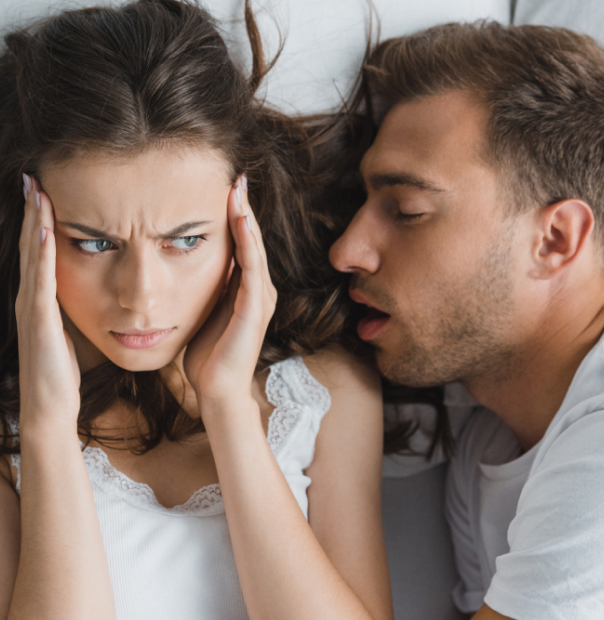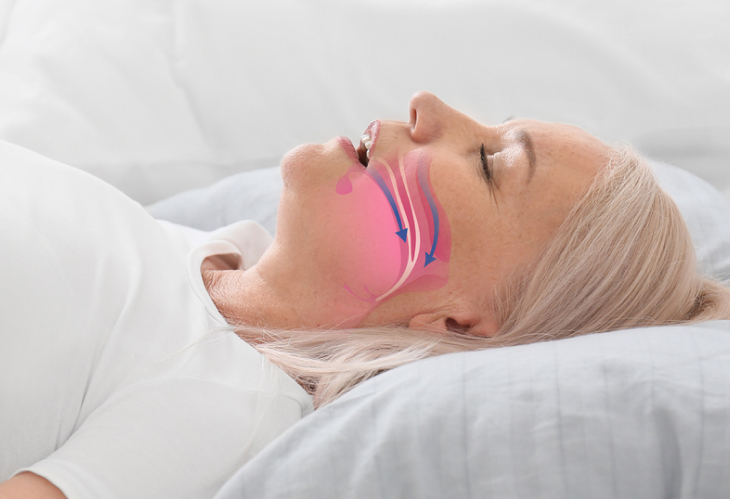Sleep apnea
Discover how sleep apnea can impact TMJ health and explore treatments designed to improve both sleep quality and jaw function.
Sleep apnea is a common sleep disorder characterized by interruptions in breathing during sleep. These pauses, which can last from a few seconds to a minute or more, cause the brain to wake the body just enough to resume breathing, leading to poor sleep quality and other health issues. Sleep apnea is often associated with symptoms like loud snoring, frequent nighttime awakenings, and excessive daytime fatigue.

Research has shown a close connection between sleep apnea and temporomandibular joint (TMJ) disorders. Sleep apnea can contribute to TMJ pain in several ways:

When the airway is obstructed, the body’s natural response is to clench the jaw or grind the teeth (bruxism) to keep the airway open. Over time, this habit places strain on the TMJ, leading to pain, inflammation, and other TMJ symptoms.
Sleep apnea disrupts restful sleep, which the body needs to repair and reduce inflammation. A lack of quality sleep can exacerbate TMJ pain by increasing inflammation in the jaw muscles and joints.
Frequent interruptions in breathing deprive the muscles of oxygen, leading to stiffness and pain in the jaw area and worsening TMJ symptoms.


Addressing sleep apnea not only improves your sleep quality but can also lead to significant relief from TMJ symptoms. Benefits of treating sleep apnea for TMJ patients include:
With proper treatment, you can minimize the need for nighttime jaw clenching, reducing strain on the TMJ.
Better sleep allows your body to repair inflammation, which is beneficial for both overall health and jaw function.
By reducing fatigue and achieving restful sleep, you’ll experience more energy throughout the day and less overall discomfort.
Treating sleep apnea helps protect against conditions like high blood pressure, heart disease, and diabetes, supporting overall wellness alongside TMJ health.
Sleep apnea often causes teeth grinding (bruxism) or jaw clenching as your body tries to open your airway during sleep. This excess strain can lead to TMJ symptoms like jaw pain, stiffness, or clicking. If you experience these symptoms along with snoring, restless sleep, or daytime fatigue, it’s worth consulting a specialist.
While treating sleep apnea won’t automatically cure TMJ, addressing the root cause of airway obstruction often reduces jaw clenching and grinding, which alleviates TMJ symptoms over time. For comprehensive relief, a combination of sleep apnea treatment and TMJ-specific care is typically recommended.
A CPAP machine is commonly used for moderate to severe sleep apnea and can help reduce symptoms of TMJ by improving breathing and reducing clenching. However, for mild cases or TMJ-specific concerns, an oral appliance may be a more comfortable and effective solution.
Most patients notice improvement in their sleep apnea symptoms and reduced TMJ discomfort within a few weeks of using an oral appliance. Regular follow-ups ensure the appliance fits properly and continues to provide relief.
Yes, oral appliances are custom-made to fit your mouth comfortably. They are designed to keep your jaw in a relaxed position, making them easy to wear throughout the night without discomfort.
Treating sleep apnea improves sleep quality, reduces daytime fatigue, and lowers the risk of serious health issues like high blood pressure, heart disease, and diabetes. It also helps prevent long-term damage to your jaw and teeth caused by clenching and grinding.
Absolutely! Losing weight, avoiding alcohol before bedtime, maintaining a consistent sleep schedule, and sleeping on your side can all reduce sleep apnea severity and minimize TMJ strain. These changes work best when combined with professional treatment.
Surgery is usually a last resort for severe cases of sleep apnea or TMJ that don’t respond to other treatments. Options may include correcting airway obstructions or jaw alignment. Most patients achieve significant relief with non-invasive methods like oral appliances or CPAP.
Sleep apnea treatment reduces the need for jaw clenching or grinding during sleep, which significantly lowers the strain on your temporomandibular joint (TMJ). This helps alleviate jaw pain, stiffness, and associated symptoms.
Start by scheduling a consultation with our team. We’ll evaluate your symptoms, provide a diagnosis, and recommend a personalized treatment plan that addresses both sleep apnea and TMJ concerns.
Take the first step towards lasting relief and improved oral health by scheduling a private consultation and diagnosis appointment with our expert team. During your personalized session, we will carefully evaluate your condition, address your concerns, and develop a customized treatment plan tailored to your unique needs. Don’t wait—experience professional care and start your journey to a pain-free life today.